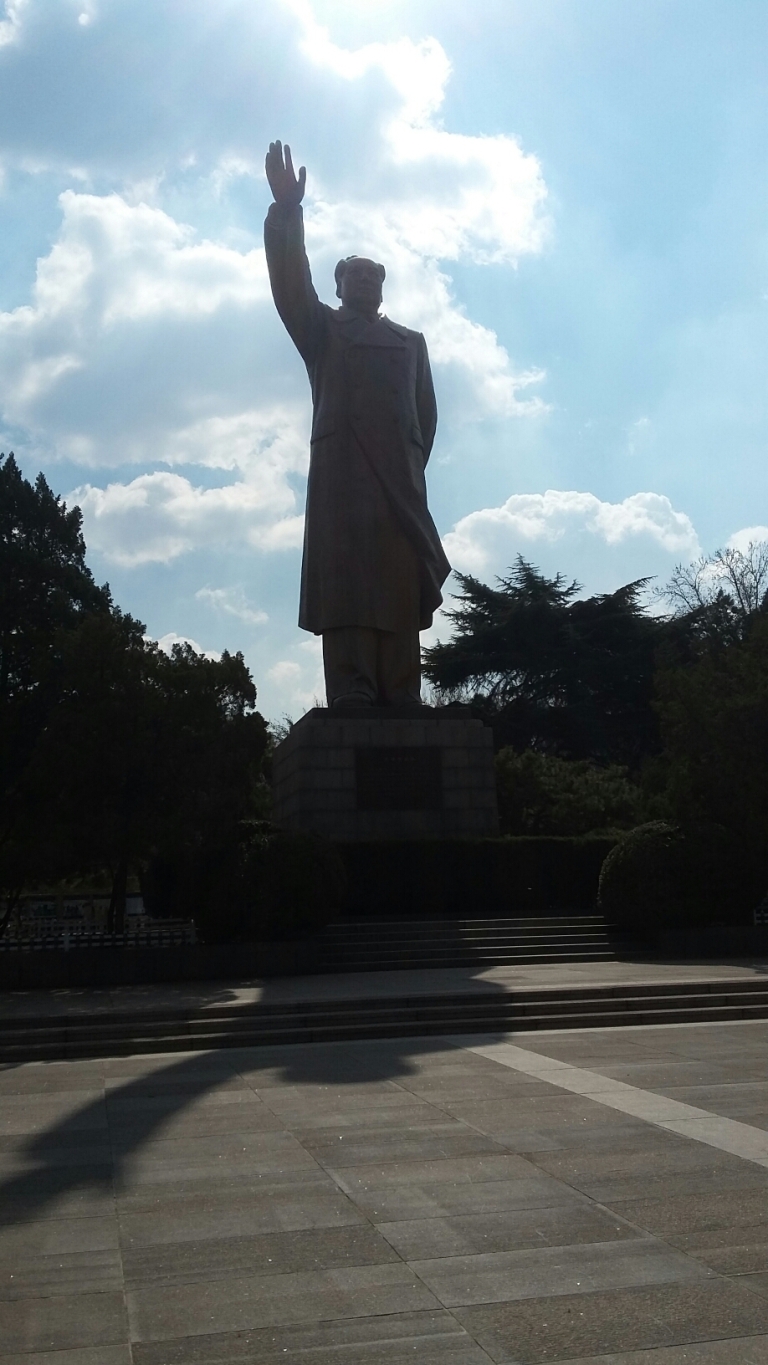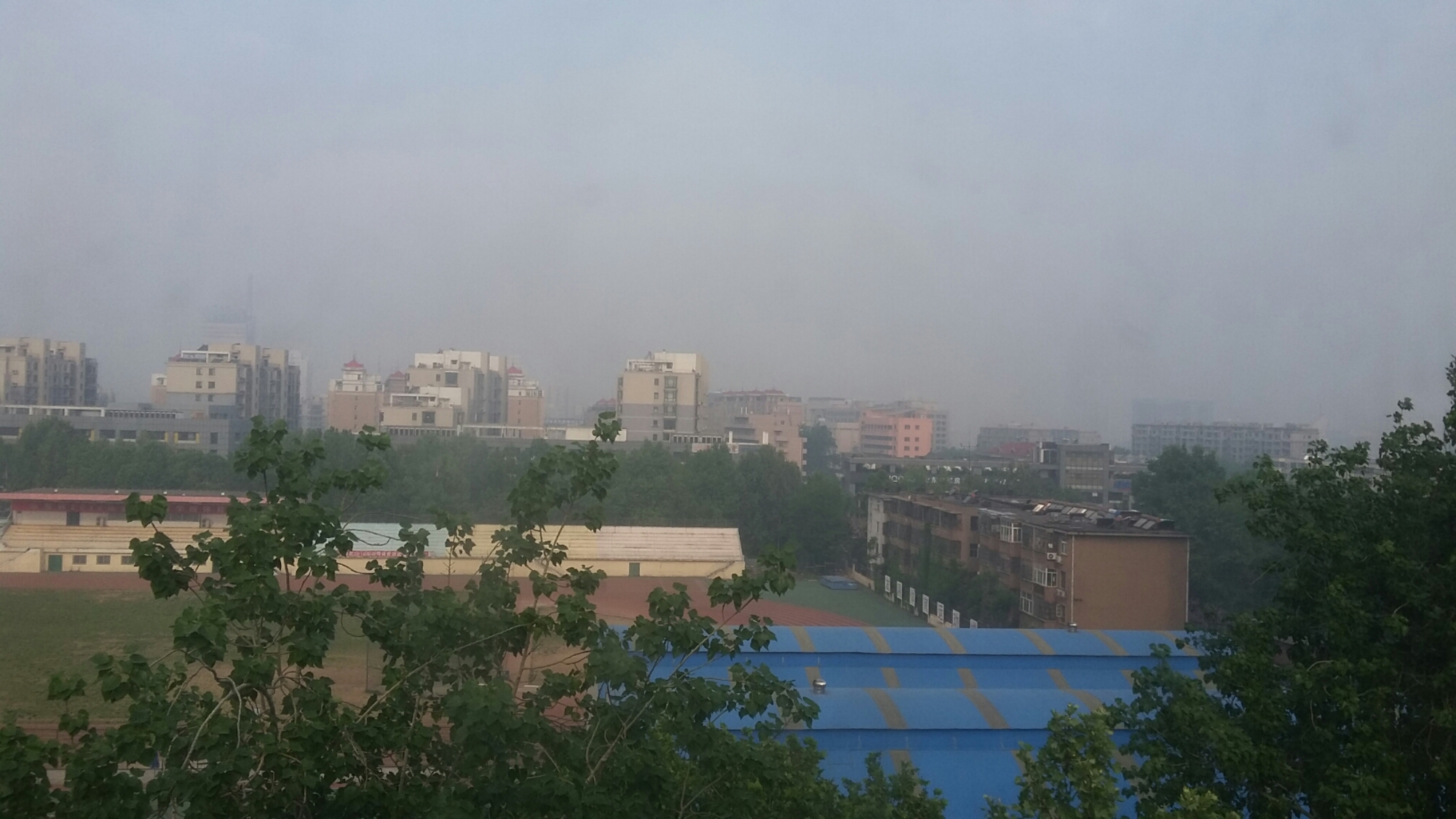I could talk about Hangzhou, capital of Zhejiang province, and how beautiful it is, particularly the West Lake. The fact that you can take a bus out of town, and walk through lush tea plantations. I might mention that our hostel was set away from the city centre, in amongst trees, and greenery and fresh air.
But we already have guidebooks and Lonely Planet for that.
I’m going to dedicate to this post to something (literally) darker; the psychology and reality of air pollution. For millions of people, especially those living in cities such as Beijing and Delhi, this is the reality of daily or at least ordinary life. Before I came to Jinan, I’d heard about the smog, but had no idea what it would actually look like, or taste or smell like, or what it would be like to live alongside.

I should add that the air pollution in Jinan does not make life unbearable; rather it’s one of the few completely negative things that I’ve experienced during my time in China. Also, as an asthmatic and someone with allergies, I’d wager that I probably feel its effects more keenly than most people. In addition, as someone who’s pretty self-aware and conscious of my environment, I probably think about this a lot more than the vast majority of people who live here.
Smog can often be romantically linked to scenes from Victorian literature; The Artful Dodger, Fagin, Bill Sykes, and the rest of the gang, skulking in alleys and hiding in smoke-filled corners. Horse-drawn carriages pulling characters like Dr. Seward in Dracula, through dimly lit neighbourhoods, as he struggled to make sense of supernatural mysteries. Then there’s Dickens himself, wandering London, restlessly walking the streets at night, by patches of lamplight which punctuate the gloom.
Living with air pollution means that you appreciate the “Good” days more, that is, days where the air has been rated as having less than 100 suspended particulates of atmospheric pollutants per aerodynamic diameter, and is thus rated “Good” (during the last two months in Jinan, I have never seen a day rated as “Excellent” for air quality, but then again, I’d only seen one or two “Severely polluted” days). Checking the Air Quality Index each morning here is as vital as checking the weather forecast in Britain (here the weather is very predictable, according to the season). If the air quality is below “Good” (e.g., it is polluted to a considerable degree) then I wear a face mask when outside.

Face masks here come in a variety of fashionable colours and designs. Some of them are designed to be re-usable, with changeable filters. Most of them are single use, and even then, it’s not known how effective they really are long-term, or whether they’re really more of a placebo effect. To be fair, like most people, I feel better wearing one, on the grounds that it can’t really do any harm. Except that psychologically, it does. No one wants to be photographed wearing a breathing mask. It’s uncomfortable meeting new people when half of your face is obscured, and you don’t want to be remembered as “the one in the mask”. Not to mention that it’s much harder to read someone’s facial expression when their face is masked (though we’ve all agreed that it makes us focus on the area around the eyes more, like how it crinkles a bit when you laugh or smile) and you can definitely come across as more robotic and austere.

The wearing of face masks is also a prime example of herd mentality. Regardless of the day’s rating, if you look out of the window and see people wearing masks, you get yours out. In an action which is all about defending us from the atmosphere, we find ourselves looking down at each other for answers. If you walk along your road and find that everyone else is wearing a mask, despite the fact that the rating was “Good” today, you start to think that you’ve missed something vital, meanwhile, if you leave your room and find that no one else is sporting a mask, then you start to wonder if you’re succumbing to paranoia, or whether everyone else is going to think that you’re a)a hypochondriac, or b) actually ill with something contagious (the other reason that people generally wear face masks in Asia). Naturally, if either a) or b) is true, then the way that people greet and perceive you throughout the day is going to be affected.
At last we come to a strange point. When discussing the struggle to stay healthy, we come to the macabre realisation that the reason that air pollution is so detestable, both on a physical and psychological level, is because its visual and tangible nature reminds us a lot of our own mortality. What better reminder of the fact that we are neither immune nor immortal, than the hovering linger of something noxious, a veritable sword of Damocles, which hangs over the heads of every human who respires. Yet this realisation can produce some very adverse reactions in people. Some, claiming that the air quality is abysmal anyway, smoke packets of cigarettes a day, and feel an odd sense of triumph that they are taking matters into their own hands, forget the government’s attempts, forget the city’s transportation re-shuffle, by smoking they feel that they are getting enjoyment out of inhaling fumes, and therefore they are counter-acting the powerlessness that comes from living under smog.
Another idea is that of spontaneity. Living in a place where the air goes from “Good” to “Hazardous” overnight makes some people impatient with life. Why put off until tomorrow something that you could do today? Who knows what the air will be like tomorrow, let’s go out now! Or, as one friend put it to me quite frankly, and with a panicked expression; “Do you ever think about the fact that one breath you take in Jinan could change your entire life?”
But isn’t that true of anywhere, without the smog to remind us?




Dear Nikita, Beautifully posed almost tangible. Though I am happy not to feel the full effects of the words particularly the smog.
You use words so beautifully – perhaps one day you will be a writer. Just describing the world around us – that often no-one takes the time to really see.
Take Care. Lots of Love Chrissie
LikeLike
Thank you! 😊 who knows what the future holds!
LikeLike